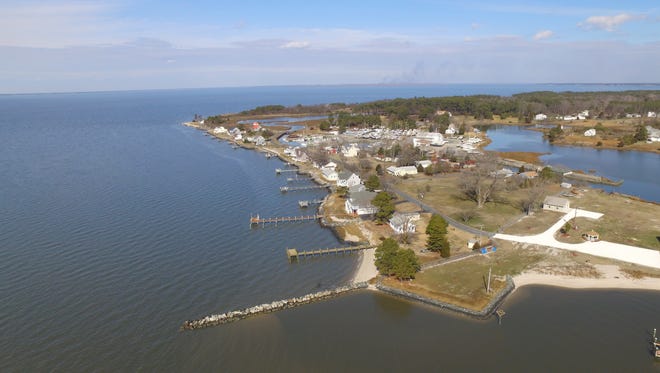Trump budget kills Chesapeake funds; 'disbelief' follows

If the Trump administration has its way, the federal government will drop out of the Chesapeake Bay restoration, leaving Maryland and other states on their own to complete the cleanup.
The White House's budget proposal eliminates the $73 million program from the Environmental Protection Agency's budget. Doing so "returns the responsibility for funding local environmental efforts and programs" to states and local jurisdictions, "allowing EPA to focus on its highest national priorities," according to the budget's authors.
Environmental advocates had prepared for the worst after a leaked budget draft two weeks ago suggested keeping just $5 million in the EPA's bay budget. But many still expressed shock Thursday with a budget recommendation that effectively shuts down the program.
“This just makes no sense. To be absolutely frank, we are in disbelief," said William Baker, president of the Chesapeake Bay Foundation. "The EPA role in the cleanup of the bay is nothing less than fundamental. So if you eliminate the bay program, you slam the door on a recovery, and that’s a recovery that’s still very fragile."
The bay program was founded in 1983 under President Ronald Reagan. But it has only been in the last few years that studies have shown measurable, continued progress in rebounding crab and oyster populations, more lush seagrass beds and fewer nutrients spilling into the bay.
Donald Boesch has studied the bay's ecological ups and downs since he was a graduate student in the late 1960s. During the past 20 years, the bay's health has stopped deteriorating and begun to show signs of improvement, he said.
In January, the Bay Foundation gave its most-glowing assessment of the Chesapeake's health. The C-minus was the highest grade the group had assigned since it began issuing a biannual report card in 1998.
“It’s just unconscionable that Congress would just let that slip away," said Boesch, president of the Cambridge-based University of Maryland Center for Environmental Science.
The budget recommendation is only that — a recommendation.

Congress ultimately crafts the budget, and 17 House members, both Democratic and Republican, recently sent a letter to Trump urging him to fully fund the bay cleanup.
"The president needs to understand that a healthy bay means a healthy economy and this cannot be accomplished without a strong federal partner," U.S. Sen. Ben Cardin of Maryland said in a statement Thursday. "Less pollution means more oysters and crabs, healthier farmland, more boats and tourism on the water and more jobs."
His Maryland colleague, Sen. Chris Van Hollen, a member of the powerful Senate Appropriations Committee, said the cuts would dismantle the cleanup and loosen rules on polluters.
"We must stand together and fight for the bay so that the watermen, the tourism and boating industries, and all those who value clean water and clean air are protected from the Trump Administration’s assault on our environment," he said in a statement.
U.S. Rep. Andy Harris, Maryland's lone Republican congressman, said Thursday he wanted to work with the administration to help the bay within the EPA's budget.
“The Chesapeake Bay is a treasure, and as a member of the Appropriations Committee, I am committed to working with the administration to prioritize programs within the Environmental Protection Agency that would preserve bay cleanup efforts," he said in a statement.
The administration's proposal comes at about the halfway point in a renewed restoration push that began in 2010 under President Barack Obama. Under an agreement, the EPA partnered with six states and the District of Columbia on a "pollution diet" to reduce the amount of ecosystem-harming nutrients and other pollutants streaming into the iconic bay and its tributaries.
It requires the jurisdictions to have steps in place to reduce nutrient and sediment pollution by 60 percent by this year. The deadline for completing the work is 2025.

Under that plan, the EPA provides much of the monitoring and scientific support to local partners. But $59 million of the current $73 million budget is given over to state and local jurisdictions, financing projects ranging from helping farmers meeting their cleanup goals, to city storm sewer upgrades.
On the Eastern Shore of Maryland and Virginia, the program has directed about $200,000 to Ducks Unlimited to protect 300 acres of black duck habitat. Another $200,000 supports the viability of the region's seafood industry. And the city of Salisbury received $75,000 to reduce stormwater runoff in its downtown.
Much of that money also helps farmers offset the costs of complying with nutrient-reduction goals.
Valerie Connelly, executive director of Maryland Farm Bureau, didn't respond directly to the proposed cuts but said her group looks forward to working with the state's congressional delegation on a final budget. The next budget goes into effect Oct. 1.
The Trump budget shuts down other local restoration projects across the country as well. In all, it saves about $427 million by eliminating funding for cleaning up the Chesapeake, the Great Lakes and other bodies of water.
Those cuts are at odds, critics say, with Trump's remarks to Congress on Feb. 28. He said at the time that he wanted to work with both parties to "promote clean air and clean water."
They also have questioned new EPA Administrator Scott Pruitt's commitment to the bay cleanup. Under questioning from Cardin during his confirmation hearing, Pruitt vowed to uphold the bay agreement.
Baker, head of the Bay Foundation, said he would like to "ask him why things are turning out differently than what he said in that congressional testimony.”
If Congress follows through with Trump's deep cuts, the state of Maryland will need to address the shortfall in its own budget, said a spokeswoman for Gov. Larry Hogan.
"Since taking office, Gov. Hogan has invested more than $3 billion in efforts to protect and restore the Chesapeake Bay and will remain a fierce advocate going forward. He will always fight to project our state’s most important natural asset," Amelia Chasse said in a statement.
410-845-4630
On Twitter @Jeremy_Cox